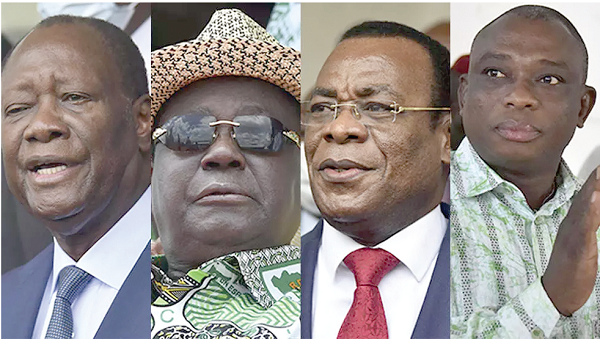
[ad_1]

Incumbent President Alassane Ouattara, former President Henry Konan Bedie, Pascal Affi Nguessan and Kouadio Konan Bertin
Ivorians will go to the polls today in an election that promises to be one of the greatest challenges to political stability since the 2010-2011 post-election crisis in that country.
In what has been described as a controversial election, current President Alassane Ouattara is seeking a third term against opposition from three other candidates: 86-year-old former President Henry Konan Bedie, leader of the Democratic Party of Ivory Coast (PDCI) , Pascal Affi Nguessan, 67, leader of the Popular Front of the Ivory Coast (FPI), formerly headed by President Laurent Gbagbo, and Kouadio Konan Bertin, 50, independent candidate.
Presidential election
Originally, 44 candidates had submitted nominations to contest the presidential elections, but the country’s Constitutional Court ruled that only four of the 44 hopefuls for the presidency could stand in the country’s presidential elections.
The rejection of the nominations of 40 contenders, including opposition heavyweight leaders former President Laurent Gbagbo and former rebel leader Guillaume Soro on the grounds that they faced criminal sentences had already increased tension, with outbreaks of protests in some parts of the country.
Country regions
Most of the others whose candidacies were declared invalid failed to garner sufficient public support: a new electoral reform required candidates to gather the signatures of at least one percent of the electorate in 17 of the country’s regions in order to stand.
The candidacy of President Alassane Ouattara for a third term in office has been plagued with controversy, as opponents and legal experts point out that the Ivory Coast Constitution limits the presidency to two terms.
However, his government maintains that because the Constitution was amended in 2016, the term count should be reset to zero.
Third term
For years, Ouattara had suggested that he would not run again and made repeated promises to hand over power to “a young generation.” He appeared to have backed up his words by declaring in March this year that Prime Minister Amadou Gon Coulibaly, 61, would contest the election in his place.
However, Coulibaly’s sudden death from a heart attack in July this year shattered his plans for his political succession, forcing Ouattara to rethink.
But the situation may spiral out of control in the former French colony, reminding the world of a similar controversial election in 2010 that resulted in the deaths of 3,000 people and Ouattara was declared the winner in the election against Gbagbo, who had also claimed victory previously. Since late 2011, the International Criminal Court (ICC) has been trying Gbagbo for his alleged role in the violence.
The four presidential contestants
Ouattara: In 2015, Ouattara won a landslide victory with 84 percent of the vote, but this time it will be difficult as he does not have the support of Henri Konan Bédié (who is possibly now his greatest rival) and faces anger the exclusion of Gbagbo and Soro from the race.
In the election campaign, he boasted of his presidential legacy of economic development.
Under his two terms, Ouattara has overseen strong economic growth, as well as security reforms and improvements in livelihoods.
The Gross Domestic Product (GDP) has grown at an average of eight percent per year (although the poverty rate remains high at 46.3 percent). Under his supervision, the government introduced universal health coverage, built new roads, and massively expanded access to electricity.
Henri Konan Bédié: The 86-year-old PDCI president is Ouattara’s main rival. Bédié served as President of the Ivory Coast from 1993 to 1999.
After being overthrown in a coup in 1999, the first in the country’s history, he went into exile in France before returning to the country in 2002 during the outbreak of the civil war.
After coming third in the 2010 presidential elections, Bédié urged PDCI supporters to back Ouattara in the second round in an ultimately successful attempt to oust Laurent Gbagbo from power, and in 2015 his party supported Ouattara again, this time from the beginning, helping the RHDP. win by a landslide.
Pascal Affi N’Guessan: Despite finishing second in the last presidential election, Pascal Affi N’Guessan faced a difficult campaign.
Gbagbo’s 67-year-old former prime minister is the “official” leader of the FPI, the left-wing party created by Laurent Gbagbo. However, after Gbagbo was sent to face charges for crimes against humanity at the International Criminal Court in 2011, the party split in two.
Gbagbo loyalists created the faction called ‘Gbagbo or Nothing’ and boycotted previous elections, refusing to recognize Affi N’Guessan as a legitimate replacement for the party’s founder.
Kouadio Konan Bertin – Affectionately known as KKB, Kouadio Konan Bertin once had high ambitions to run as a PDCI candidate. But after fighting with Bédié in 2015, he decided to run as an independent, finishing third in the last election.
Konan Bertin tried to win the nomination to stand for the PDCI in the face of these elections, but he targeted Bédié in an interview with Jeune Afrique and was ultimately rejected by the party. The 51-year-old ex-MP is now running as the only independent candidate in the elections.
conclusion
As Cote d’Ivoire goes to the polls today, the hope is that they will come out of the exercise peacefully. However, if we are to follow what is happening in Guinea after the outcome of the elections, then there is everything to pray for peace to reign in Cote d’Ivoire.
[ad_2]